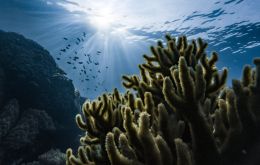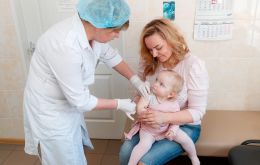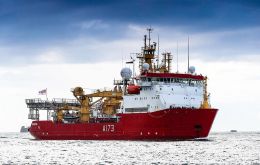MercoPress. South Atlantic News Agency
Health & Science
-
Monday, April 29th 2019 - 09:32 UTC
Australia plans to cull two million feral cats to save native wildlife

Australia's federal government is once again in the spotlight for a years-old plan to cull 2 million feral cats by 2020, this time after details emerged about the reported use of poison-laced sausages to reduce the island's wild cat population.
-
Saturday, April 27th 2019 - 09:43 UTC
Oceans teeming with viruses, from North to South Pole and down to 4000 meters deep

The oceans contain almost 200,000 different viral populations, according to the latest count. Marine viruses were found from the surface down to 4,000m deep and from the North to the South Pole. Though most are harmless to humans, they can infect marine life, including whales and crustaceans.
-
Friday, April 26th 2019 - 09:03 UTC
Two Los Angeles universities on quarantine following measles outbreaks

A United States nationwide measles outbreak has led health officials to quarantine dozens of people at two Los Angeles universities, officials said on Thursday. The quarantine affects the University of California, Los Angeles (UCLA) and California State University, Los Angeles (Cal State LA) and comes as the United States battles the highest number of measles cases since the country declared the virus eliminated in 2000.
-
Friday, April 26th 2019 - 08:41 UTC
Bolsonaro worried horrified over penis amputations because of lack of hygiene

Brazilian President Jair Bolsonaro on Thursday expressed horror over the 1,000 penis amputations that he said occur each year in the country due to a lack of basic hygiene, a figure he called “ridiculous and sad.”
-
Friday, April 26th 2019 - 08:33 UTC
World Immunization Campaign Week

This week is World Immunization Week, which runs until April 30th. This campaign, celebrated worldwide, aims to champion the power of vaccines to protect our health, and prevent outbreaks, according to the World Health Organization.
-
Friday, April 26th 2019 - 06:32 UTC
HMS Protector returns to Plymouth for first time in four years

The ship has spent time in Antarctica supporting scientists and surveying the channels and waterways. HMS Protector has returned to Plymouth for the first time in four years. The ship spent a lot of her time in Antarctica supporting scientists and surveying the channels and waterways around the frozen continent.
-
Thursday, April 25th 2019 - 08:50 UTC
WHO guidelines on physical activity, sedentary behavior and sleep for children under 5 years of age

Children under five must spend less time sitting watching screens, or restrained in prams and seats, get better quality sleep and have more time for active play if they are to grow up healthy, according to new guidelines issued by the World Health Organization.
-
Monday, April 15th 2019 - 17:44 UTC
The world's largest airplane made its first test flight in California

The world’s largest airplane made its first test flight on Saturday in California. Stratolaunch Systems Corporation, founded by Paul G. Allen, on Sunday successfully completed the first flight of the world’s largest all-composite aircraft, the Stratolaunch.
-
Saturday, April 13th 2019 - 07:17 UTC
Facebook spent US$ 22.6m in CEO Zuckerberg's security in 2018

Facebook Inc more than doubled the money it spent on Chief Executive Officer Mark Zuckerberg's security in 2018 to US$22.6 million, a regulatory filing showed on Friday. Zuckerberg has drawn a base salary of US$1 for the past three years, and his “other” compensation was listed at US$22.6 million, most of which was for his personal security.
-
Friday, April 12th 2019 - 18:06 UTC
Swiss government wants to get rid of its coffee emergency stockpile

The Swiss government wants to put an end to its emergency stockpile of coffee after declaring that it is “not essential” for human survival. Switzerland began storing emergency reserves of coffee between World War One and World War Two in preparation for potential shortages.